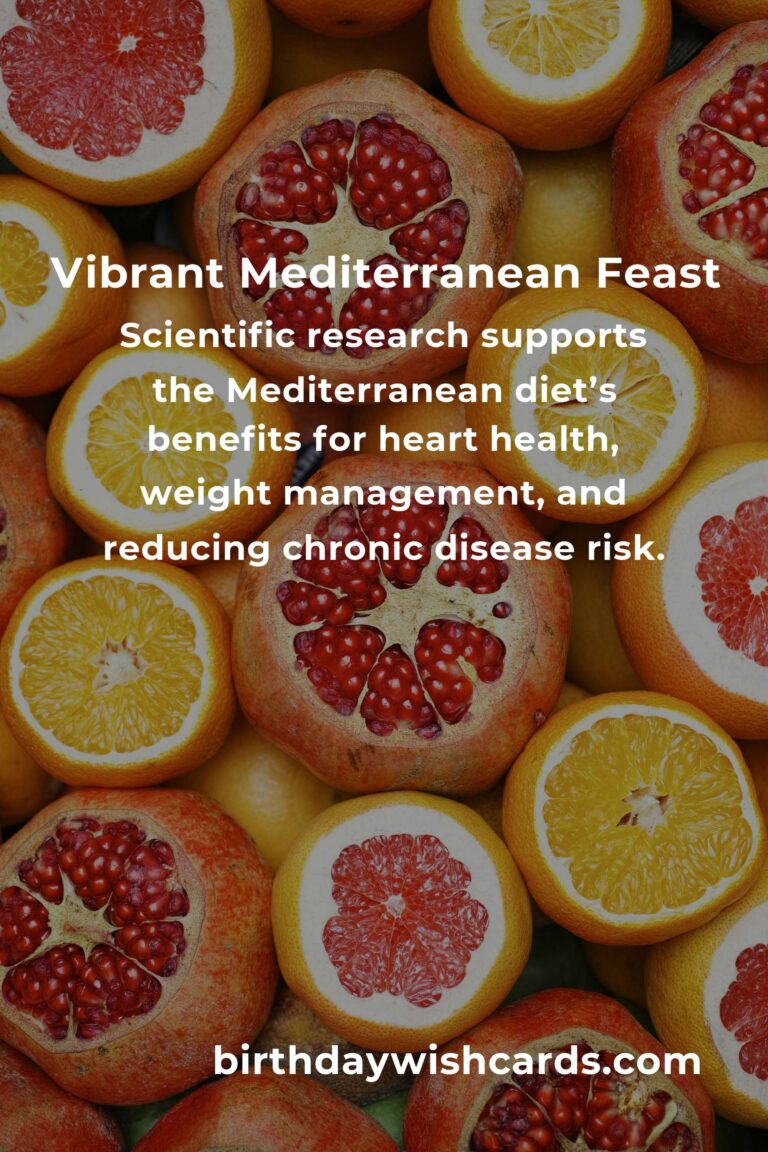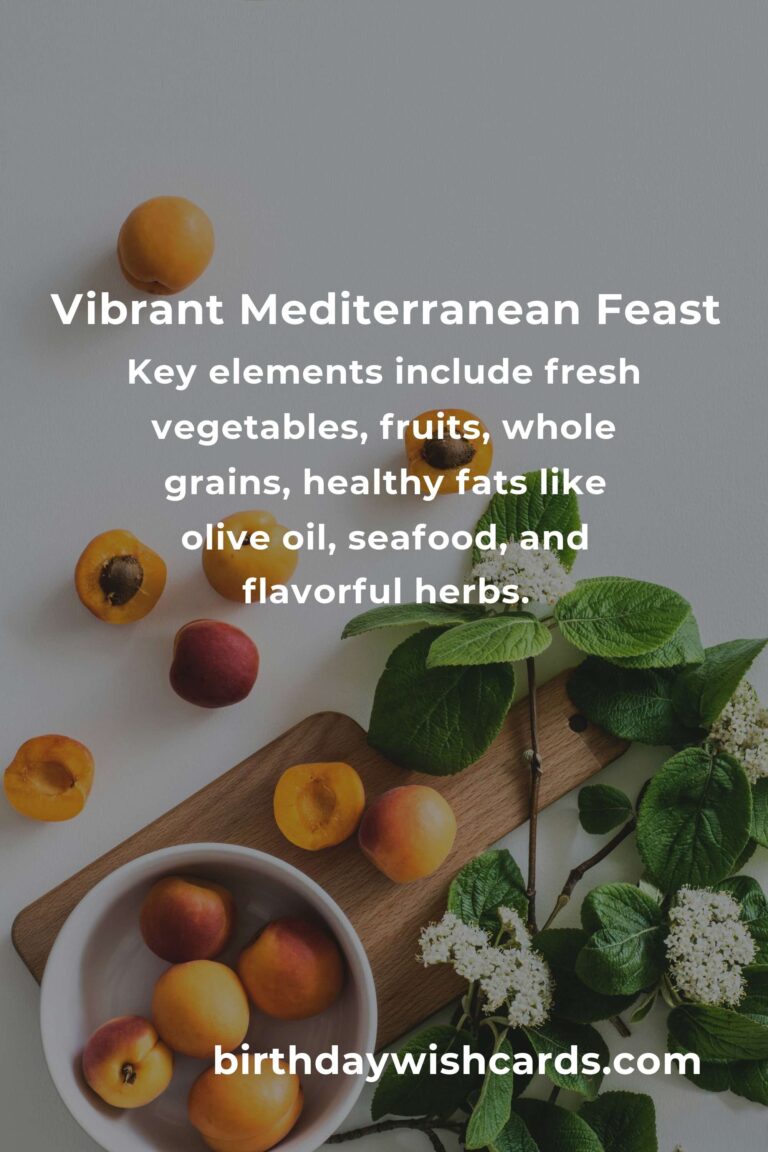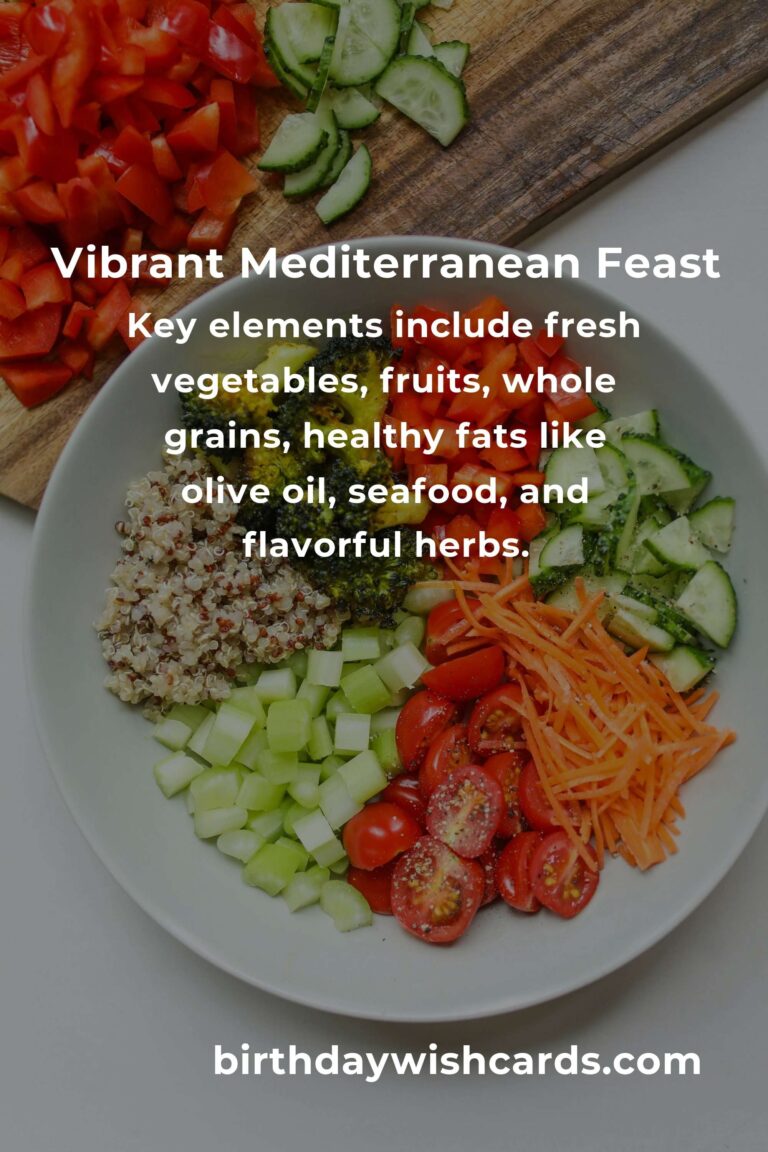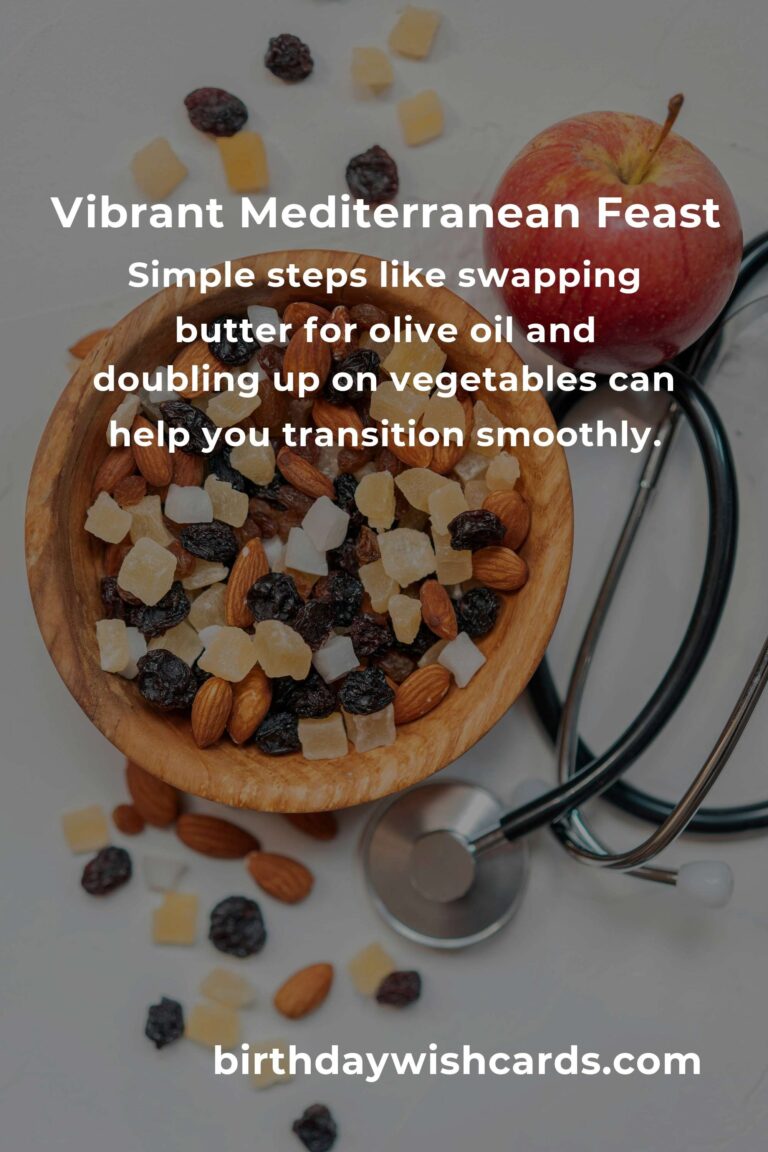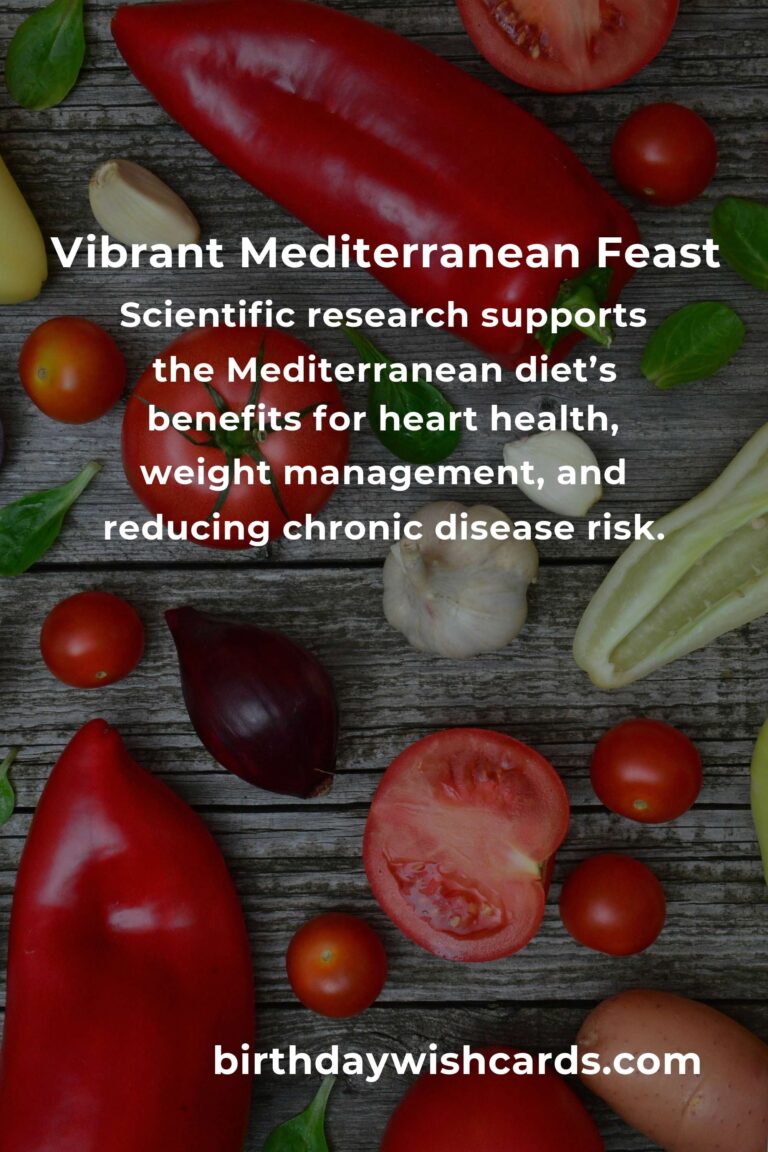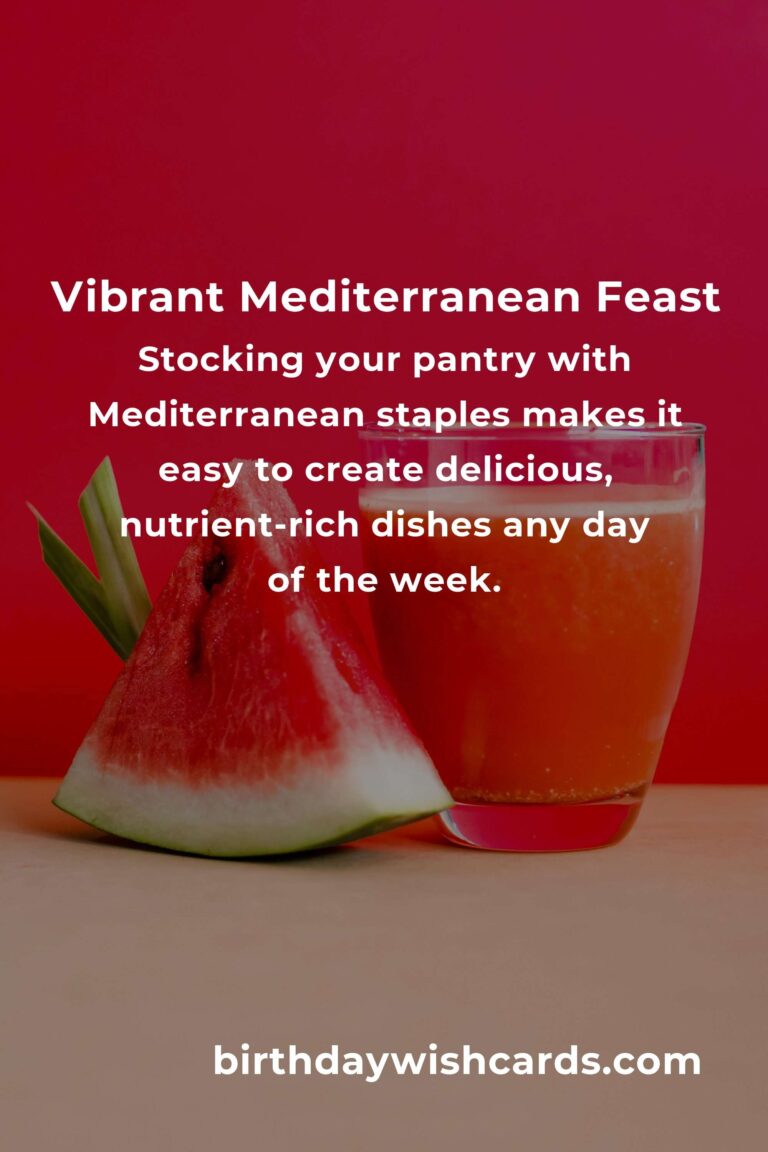
The Mediterranean diet isn’t just another passing food trend—it’s a timeless approach to eating that has nourished generations across southern Europe’s sun-soaked coasts. Celebrated for promoting longevity, heart health, and a rich culinary heritage, the Mediterranean diet is a dream for food lovers who crave delicious meals without sacrificing nutrition. In this comprehensive guide, we’ll dive deep into the key principles, health benefits, essential ingredients, meal ideas, and actionable steps to savor Mediterranean cuisine every day.
What Is the Mediterranean Diet?
The Mediterranean diet is inspired by the traditional eating patterns of countries bordering the Mediterranean Sea, including Greece, Italy, Spain, and southern France. It’s not a strict regimen or a calorie-counting plan—it’s a lifestyle rooted in wholesome, minimally processed foods, enjoyment, and balance.
The Core Principles of the Mediterranean Diet
- Plant-Based Focus: Vegetables, fruits, legumes, whole grains, nuts, and seeds form the base of most meals.
- Healthy Fats: Olive oil reigns supreme, replacing butter and margarine. Avocados, nuts, and fatty fish provide additional sources of unsaturated fats.
- Seafood and Lean Proteins: Fish and seafood are enjoyed several times per week, with poultry, eggs, and dairy (yogurt, cheese) in moderation.
- Limited Red Meat and Sweets: Red meat and sugary desserts are occasional luxuries, not daily staples.
- Herbs and Spices: Flavor comes from aromatic herbs, garlic, and citrus rather than salt or heavy sauces.
- Social Eating: Meals are savored and often shared, reflecting a mindful, community-oriented lifestyle.
Why Food Lovers Adore the Mediterranean Diet
Unlike restrictive diets, the Mediterranean way celebrates abundance, variety, and sensory pleasure. Here’s why food lovers find it irresistible:
- Flavorful Diversity: Think sun-ripened tomatoes, robust olive oils, briny cheeses, grilled seafood, fragrant herbs, and vibrant salads.
- Ease of Preparation: Many dishes are simply prepared, requiring minimal equipment and prep time.
- Flexibility: It’s adaptable to dietary restrictions—gluten-free, dairy-light, or vegetarian variations are easy to implement.
- Wine (in Moderation): A glass of red wine with meals is customary for those who choose to imbibe, enhancing dining enjoyment.
Health Benefits Supported by Science
Curious why the Mediterranean diet consistently ranks atop the healthiest global eating patterns? Research points to impressive health outcomes, including:
- Heart Health: Lowers LDL cholesterol and reduces heart disease risk thanks to healthy fats and antioxidants.
- Weight Management: Promotes satiety and sustainable weight loss through fiber-rich foods.
- Lower Risk of Chronic Diseases: Associated with reduced incidence of Type 2 diabetes, certain cancers, Alzheimer’s, and Parkinson’s diseases.
- Anti-Inflammatory Effects: Loaded with polyphenols, carotenoids, and omega-3s, which calm inflammation and support immune health.
Essential Ingredients for Your Mediterranean Pantry
Stocking your kitchen with Mediterranean staples ensures you’re always ready to whip up a nourishing feast. Here’s your shopping list:
- Extra-Virgin Olive Oil: Use as your main cooking and dressing oil.
- Fresh and Dried Herbs: Basil, oregano, thyme, rosemary, parsley, dill, and mint.
- Fruits and Vegetables: Tomatoes, eggplants, peppers, leafy greens, citrus, grapes, figs, cucumbers, onions, and artichokes.
- Whole Grains: Brown rice, bulgur, farro, barley, quinoa, whole-wheat bread and pasta.
- Legumes: Lentils, chickpeas, white beans, and fava beans.
- Nuts and Seeds: Almonds, walnuts, pistachios, sunflower seeds, pumpkin seeds.
- Seafood: Salmon, sardines, anchovies, mussels, shrimp, calamari, and tuna.
- Dairy: Plain Greek yogurt, feta cheese, ricotta, halloumi, and aged cheeses used sparingly.
- Poultry and Eggs: Chicken, turkey, duck, and cage-free eggs.
- Wine: Red or white, consumed occasionally with meals.
Sample Mediterranean Meal Plan for Food Lovers
Ready for culinary inspiration? Here’s a sample day full of delicious Mediterranean dishes:
- Breakfast: Greek yogurt with honey, walnuts, and fresh berries. Whole wheat toast with sliced tomatoes and olive oil.
- Snack: Sliced cucumber and red peppers with hummus.
- Lunch: Chickpea salad with tomatoes, cucumber, olives, feta, red onion, parsley, and a lemon-olive oil dressing. Side of whole grain pita.
- Snack: Mixed nuts or fruit, such as an apple or a handful of grapes.
- Dinner: Grilled salmon drizzled with herb-citrus vinaigrette, roasted Mediterranean vegetables (eggplant, zucchini, bell peppers), and a side of farro.
- Dessert: Fresh figs or a small portion of baked apples with cinnamon.
Delicious Mediterranean Recipes to Try
1. Classic Greek Salad
Ingredients: Tomatoes, cucumbers, red onion, Kalamata olives, feta cheese, olive oil, oregano, salt, pepper.
Instructions: Chop all vegetables, combine in a bowl, top with feta, drizzle with olive oil, season generously with oregano, salt, and pepper. Toss and serve.
2. Simple Caponata (Sicilian Eggplant Stew)
Ingredients: Eggplant, celery, tomatoes, capers, olives, onion, vinegar, olive oil, basil.
Instructions: Dice and sauté eggplant and onion, add celery, tomatoes, olives, capers, and vinegar. Simmer until soft and richly flavored. Garnish with basil.
3. Spanish-Style Grilled Shrimp
Ingredients: Large shrimp, garlic, smoked paprika, olive oil, lemon juice, fresh parsley.
Instructions: Marinate shrimp in olive oil, garlic, paprika, and lemon. Grill 2–3 minutes per side. Sprinkle with parsley and serve as tapas or with rice.
4. Homemade Hummus with Za’atar
Ingredients: Chickpeas, tahini, lemon juice, garlic, olive oil, za’atar spice.
Instructions: Blend chickpeas, tahini, lemon juice, garlic, and olive oil until smooth. Sprinkle with za’atar and serve with raw vegetables or pita.
Tips for Adopting the Mediterranean Diet in Daily Life
- Shop Fresh and Local: Visit farmer’s markets or produce stands and choose what’s in season.
- Cook in Batches: Prepare beans, grains, and soups in advance for easy, healthy meals during busy weeks.
- Eat Mindfully: Slow down. Enjoy your food, savor flavors, and prioritize shared meals with friends or family.
- Adjust Gradually: Start by swapping butter for olive oil, adding extra vegetables to meals, and incorporating fish twice weekly.
- Don’t Fear Healthy Fats: Embrace avocados, nuts, and olive oil—they’re good for you and satisfying to your palate.
- Flavor with Herbs: Reach for fresh basil, mint, oregano, or dill instead of excess salt or processed seasonings.
Mediterranean Diet Myths Debunked
- Myth: It’s all about pasta and bread.
Fact: While grains are part of the diet, the real focus is on vegetables, legumes, and healthy fats. - Myth: Eating fat is unhealthy.
Fact: Plant-based fats—especially from olive oil and nuts—are central to heart health. - Myth: You have to eat fish daily.
Fact: Simply eating more plant foods and choosing seafood a couple times per week is sufficient.
Sustainable and Ethical Aspects of the Mediterranean Diet
The Mediterranean lifestyle promotes seasonal, local produce and moderate amounts of animal products, which aligns with sustainable eating principles:
- Less Food Waste: Creative use of leftovers, like turning day-old bread into salads (panzanella) or soups.
- Support for Local Farmers: Prioritizing fresh, local foods helps small producers and reduces food miles.
- Eco-Conscious Choices: Emphasis on plants over meat is better for the environment and your health.
Frequently Asked Questions About the Mediterranean Diet
Is the Mediterranean diet suitable for vegetarians and vegans?
Absolutely. With its focus on vegetables, fruits, legumes, grains, nuts, and seeds, the Mediterranean diet is easily adapted for vegetarians and can be made vegan by substituting dairy and omitting seafood.
Can I lose weight on the Mediterranean diet?
Many people experience healthy, steady weight loss on the Mediterranean diet because of its focus on filling, nutrient-dense foods and healthy fats that promote satiety.
How often can I enjoy wine?
Wine is included in moderation—typically one glass per day with meals for women and up to two for men, but always consult your own health needs and limits.
Do I have to completely eliminate desserts?
No. Desserts of fresh fruit, baked goods using whole grains and nuts, or naturally sweet treats like yogurt with honey fit the Mediterranean lifestyle. Just enjoy them occasionally.
How to Get Started: A Step-by-Step Transition Plan
- Replace Butter with Olive Oil: Make olive oil your go-to for cooking, baking, and dressings.
- Double Your Vegetable Intake: Add a salad or an extra side of roasted veggies with every meal.
- Plan Seafood Nights: Try grilled fish or seafood stew once or twice a week.
- Add Legume-Based Meals: Enjoy hummus, bean soups, or lentil salads regularly.
- Rethink Snacks: Swap chips and sweets for olives, nuts, and fruit.
- Enjoy Food with Others: Make meals a time to relax and connect, not just refuel.
Conclusion: Embrace the Mediterranean Diet for a Lifetime of Flavor and Well-Being
The Mediterranean diet is more than just a way of eating—it’s a celebration of life, flavor, and community. For food lovers, it provides endless variety, joy, and satisfaction, all while delivering proven health benefits. By bringing more Mediterranean ingredients, recipes, and habits to your kitchen, you’ll nourish both your body and your love for great food.
Inspiration for Your Mediterranean Table
Picture a vibrant spread: grilled fish with lemon, bowls of tabbouleh, olives glistening with oil, rustic loaves of bread, and carafes of wine. This is the Mediterranean promise—flavor, health, and togetherness awaiting you at every meal. Start your Mediterranean journey today—and savor every delicious bite!
The Mediterranean diet combines vibrant, wholesome foods with a joyful approach to eating, making it perfect for food lovers.
Key elements include fresh vegetables, fruits, whole grains, healthy fats like olive oil, seafood, and flavorful herbs.
Scientific research supports the Mediterranean diet’s benefits for heart health, weight management, and reducing chronic disease risk.
Stocking your pantry with Mediterranean staples makes it easy to create delicious, nutrient-rich dishes any day of the week.
The diet is flexible, adaptable for vegetarians and vegans, and encourages mindful, social eating.
Simple steps like swapping butter for olive oil and doubling up on vegetables can help you transition smoothly.
Start embracing the Mediterranean lifestyle for improved well-being and a lifetime of flavor-packed meals.
#MediterraneanDiet #HealthyEating #FoodLovers #Nutrition #HeartHealth #MediterraneanCuisine #Wellness


